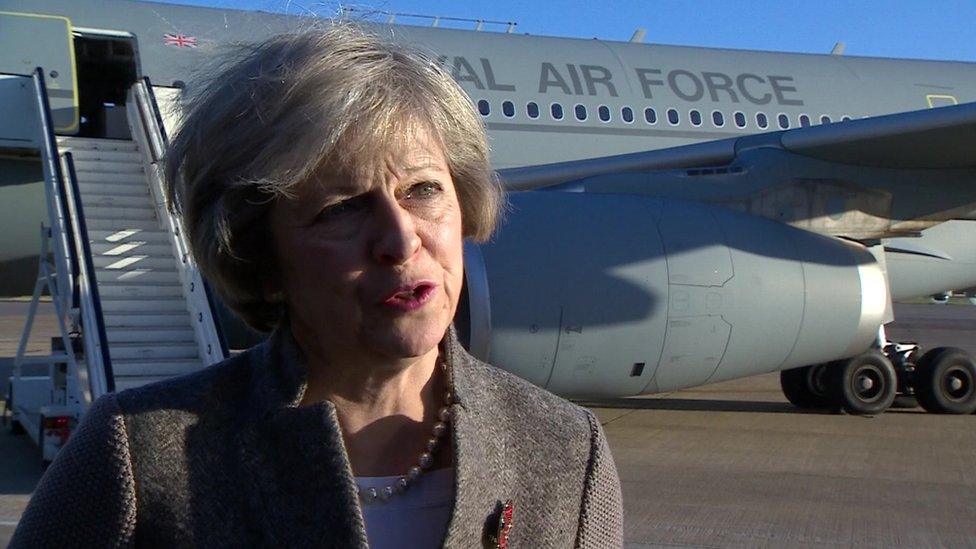Theresa May backs judges' independence after Brexit ruling
- Published
Nigel Farage and Gina Miller clash over Brexit
Theresa May has defended judges' "independence" after the High Court was attacked for its ruling on Brexit.
The court decided last week that Parliament should get a vote on when the process of leaving the EU starts.
The Daily Mail branded the judges "enemies of the people", while UKIP's Nigel Farage warned of street protests if the referendum result was ignored.
The government is appealing against the ruling and the PM said it would be setting out "strong legal arguments".
Judges ruled on Thursday Parliament should vote on when the government can trigger Article 50 of the Lisbon Treaty, starting two years of formal negotiations with the EU.
The government argues ministers already have sufficient powers - under the Royal Prerogative - to do this without MPs and peers having a vote. It has promised to fight to get the ruling overturned next month in the Supreme Court.
It says the High Court's decision will not affect its Brexit timetable, but this has not prevented fierce criticism of the ruling from some newspapers, who fear it could open up the possibility of delays.
Labour has said it will not seek to delay the triggering of Article 50, but some Remain-supporting MPs, including ex-Conservative minister Ken Clarke and former Lib Dem leader Nick Clegg, have told the BBC that they are prepared to vote against it.
The SNP's Brexit Minister Mike Russell has also told BBC's Sunday Politics Scotland programme he "can't imagine" any circumstances in which his party's 54 MPs would vote to trigger it.
On her way to Delhi for a visit to promote UK-India trade, Mrs May said: "I believe in and value the independence of our judiciary. I also value the freedom of our press. I think these both underpin our democracy and they are important.
"Of course the judges will look at the legal arguments. We think we have strong legal arguments and we will be taking those arguments to the Supreme Court."

Analysis: John Pienaar, BBC deputy political editor, travelling with the prime minister

At 37,000 feet, above the roar of the engines propelling the prime minister's official RAF Voyager aircraft towards Delhi, Theresa May's verdict on the raging "Press v judges" dispute was heard loud and clear in the crowded cabin.
"I value the independence of the judiciary," she said. "I also value the freedom of the press."
The latter was "important to democracy", she added.
True, no prime minister would ever offer anything other than an unqualified endorsement of press freedom if invited to do so. But Mrs May repeated the words twice.
Those who were outraged by the strength of the papers' attacks, and even saw the criticism as an assault on the independence of the judiciary, will be far less pleased than the editors framing the morning editions.

Speaking on the BBC's Andrew Marr Show, UKIP leader Mr Farage said the court's decision meant the country was faced with "half Brexit", adding the "reach of the European Union into the upper echelons of this country makes it quite difficult for us to trust the judgement".
He warned: "If the people of this country think that they're going to be cheated, they're going to be betrayed, then we will see political anger, the likes of which none of us in our lifetimes have ever witnessed."
Asked if there was a danger of disturbances in the street, he replied: "Yes, I think that's right."
But the campaigner who brought the High Court case said it would stop ministers acting like a "tin-pot dictatorship".
Investment manager Gina Miller told the BBC: "Everyone in this country should be my biggest fan, because we have used our own money to create certainty about the way ahead."
Labour leader Jeremy Corbyn said his party "respected the result of the referendum", adding that "Article 50 will be invoked and there will be negotiations".
He said: "We are part of the negotiations, and we are very tough on this. We want to see Britain having a trading relationship with Europe and protections maintained for British workers."
Mr Corbyn called on the government to reveal its negotiating strategy, arguing: "We can't have a prime minister obfuscating and hiding behind the idea that she has some executive authority which she clearly does not have. Parliament has the authority."
But the government said that to give its stance away ahead of Article 50 being invoked would be counterproductive, putting it at a disadvantage when it negotiates issues like trade agreements and the movement of people.